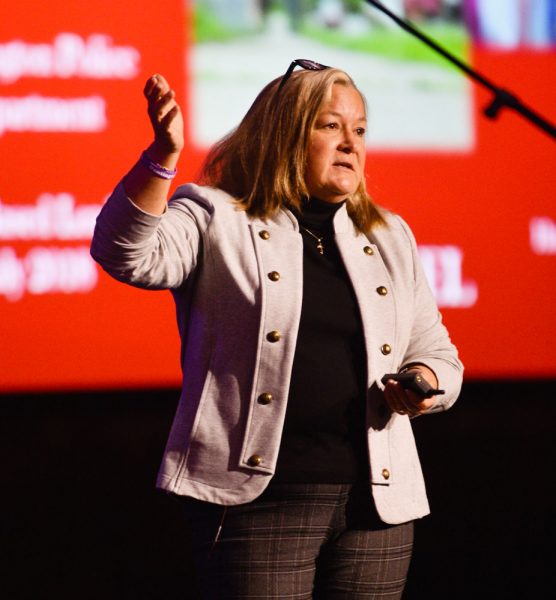
Connie Priddy, coordinator of the Quick Response Team from Huntington, West Virginia, speaks at a recent Families Against Narcotics meeting. Courtesy of Families Against Narcotics
By Claire Convis
Deputy Editor
Washtenaw Families Against Narcotics strives to educate and provide resources and community for people in recovery, as well as their friends and families. Cofounder Mario Nanos speaks at high schools, business meetings, and to sports teams. “I go wherever anyone wants to learn,” said Nanos.
Guest speakers for FAN meetings come from all over the United States.
The guest speaker for the latest FAN meeting was Connie Priddy, coordinator of the Quick Response Team program (QRT) in Huntington, West Virginia. The QRT is a program that responds to locations of opioid overdoses within 48 hours. QRT teams include strategic members such as medical staff, professional counselors, a member of law enforcement, and a faith-based leader.
Priddy spent over 25 years as a flight nurse; she spent some time at a desk job but that wasn’t for her because she wanted to take care of people, especially when her community was suffering so severely. “We got to the point where we were averaging about six overdoses per day,” said Priddy.
On Aug. 16, 2016, Huntington suffered 26 overdoses in four hours. Priddy said that not one of the people who overdosed were offered treatment. “We’ve got a problem, and it’s not them, it’s us. It’s all of us,” said Priddy.
“[The QRT teams] find out where overdoses are happening, and they go knock on the door,” said Nanos. “Somebody answers and they say ‘Hi, we’re here from your community because we care.’”
Nanos said that many who opened their doors were surprised to find such a caring support system at their fingertips, and subsequently the overdose rate in Huntington, West Virginia, dropped by 40%.
“Why does QRT work so well? It takes the stigma away,” said Nanos. The teams build connections and help people with substance abuse start their journey to healing.
“These are just individuals in need,” said Priddy. “The need help, they need somebody to care, and that’s what the team does.”
When the QRT makes house calls and no one answers, the team may leave Narcan kits hanging on the door. One day, a man called the team’s number and said, “You left Narcan at my door, and I don’t need it.” At first, the team worried that the man was angry, but he went on to say, “My son died on Monday. I want you to have the Narcan back because it’s a lifesaver, and someone else could use it.”
If you cut yourself and get stitches, Proddy said, someone from the hospital will call and check in on you; they would ask how you feel, if the stitches are bleeding, and the QRT treats overdoses the same way.
“Not one treatment fits everyone,” Priddy said, citing that it is important to find out what works best for each specific person. If people with substance abuse are not quite ready for treatment, the team holds their contact information in the system and keeps in touch with them.
Lt. Lisa King from the Washtenaw County Sheriff’s Department attended the January FAN meeting, and encouraged anyone over 18 to attend the free Naloxone training held at WCC on Feb. 10. It is important to receive the training and the free Naloxone kit “even if you don’t have someone who is in recovery in your family,” said King, who is helping lead the training. “You could be in a restaurant, you could be in a grocery store, and the training could save a life,” said King.
Along with trainings, FAN offers a variety of other resources, including free bus tokens so that people in recovery have transportation to get to meetings, events, exercise classes, and housing.
“It never ceases to amaze me how this community is enveloping people,” said Nanos.
“All of our staff carries Narcan,” said Scott Hilden, Chief of Public Safety at WCC, who praised the “miraculous” effects of this life-saving reversal drug.
“With Narcan being out in as many hands as possible, there’s less chance of death,” Hilden said.
| Upcoming Meetings and Events |
|
Free Naloxone Training at WCC: WCC Collegiate Recovery Programs: FAN meetings: |
